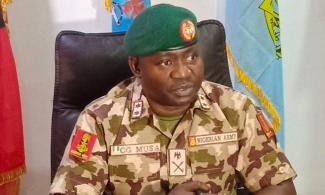
Musa said Nigeria was unable to buy much-needed military hardware from several countries because of human rights concerns.
Nigeria’s Chief of Defence Staff (CDS) General Christopher Musa, has expressed frustration with what he called the “double standards” of some countries that have refused to sell military weapons to Nigeria because of human rights concerns.
Musa said Nigeria was unable to buy much-needed military hardware from several countries because of human rights concerns.
According to AP's report, Musa’s comment underscores one of the biggest challenges for Africa’s most populous nation in combating a deadly and complex security crisis, from the Islamic militant insurgency in the North-East to the dozens of armed groups targeting travellers and communities in the northwest and central regions.
The CDS, who spoke on Tuesday in Abuja, acknowledged a huge need for items such as helicopters, drones and Mine Resistant Ambush Protected (MRAP) vehicles.
“Even with our money, it is difficult getting equipment,” Musa regretted. “Some say human rights, some say ‘You have killed’ but again, sometimes, people pointing fingers at you have done worse and yet nobody is holding them to account."
"It is these double standards that (are) making the world more dangerous,” he stated even as he declined to name the countries in question when asked by The Associated Press.
Nigeria’s security forces for many years have faced allegations of extrajudicial killings and illegal arrests. The United States and other major arms suppliers at one point or another have withheld the sale of weapons over those accusations.
In December, at least 85 civilians were killed when a Nigerian army drone erroneously targeted a religious gathering in northwest Kaduna state, the latest of several such incidents.
Musa said Nigeria’s military has continued to improve on its human rights record and is holding its personnel to account. Alleged abuses are often investigated, and a report on the December incident will be released soon, he said.
“The Nigerian Armed Forces have the capacity to secure Nigeria (and) the entire region,” Musa said, but added that the lack of needed weapons will continue to limit that capacity.
However, there is little evidence to show that Nigeria’s military has improved on its human rights record, according to Isa Sanusi, Amnesty International’s director in Nigeria.
“Protecting civilians should be their priority (and) they should look at all human rights violations they have committed to ensure accountability,” Sanusi said.
U.S. military support to Nigeria has at times included training on how to mitigate risks to civilians, according to a State Department statement in January on security cooperation. It said that in August, Nigeria delivered the first payment for 12 attack helicopters worth a total of $997 million.